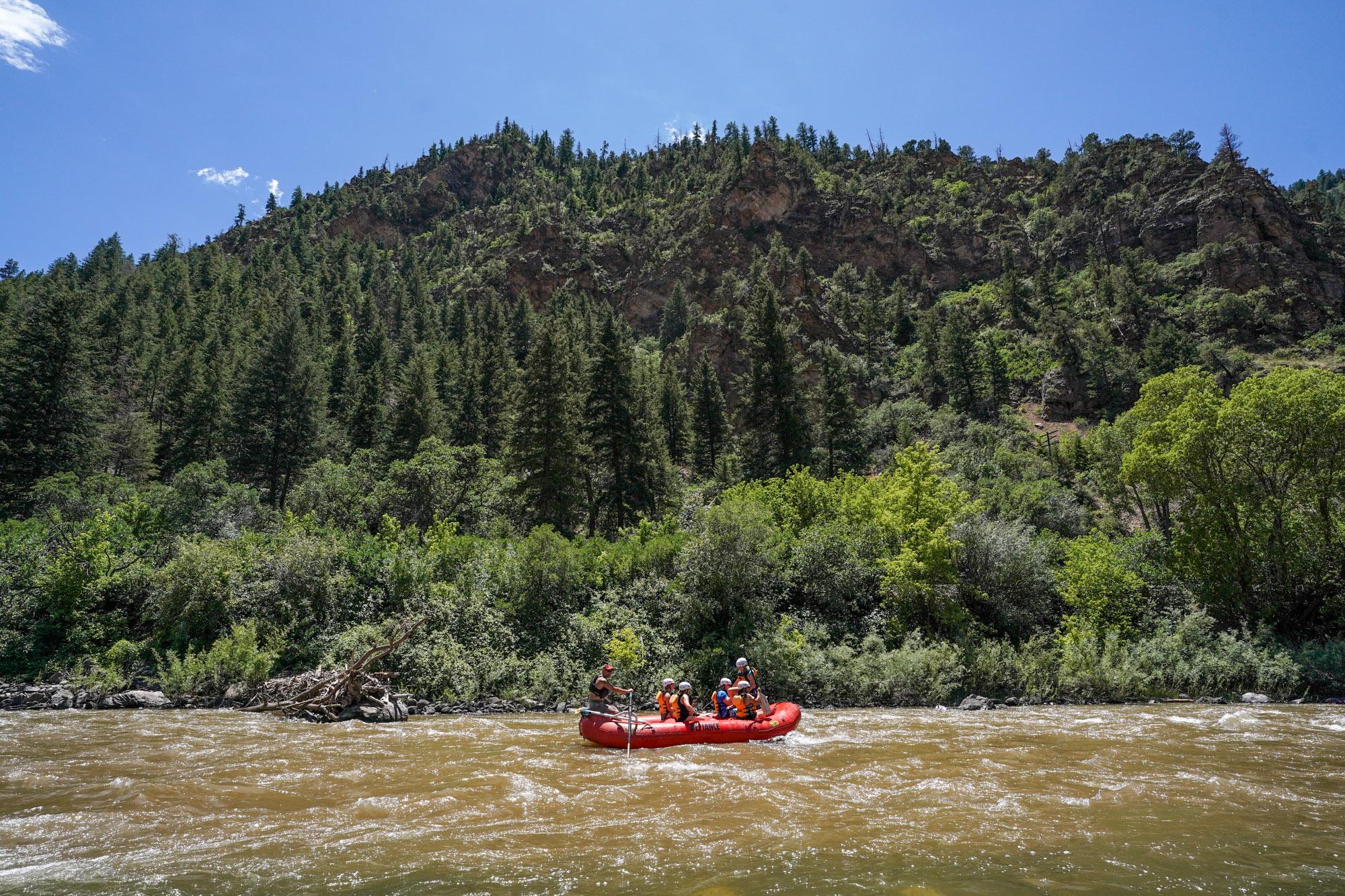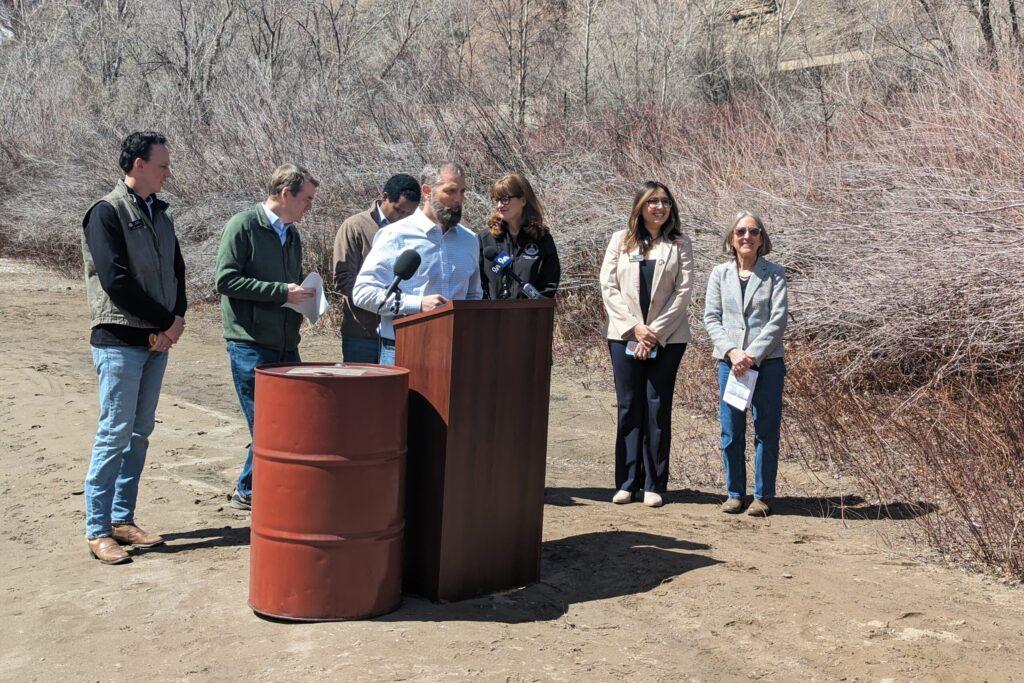
A railway project in Eastern Utah is drawing significant pushback in Colorado as elected officials voice concerns about crude oil risks to the Colorado River, which is the West’s primary freshwater river.
The Uinta Basin Railway project would build around 80 miles of train tracks connecting oil production to America’s rail network. That would allow producers to ship crude oil on trains through Colorado to refineries elsewhere in the country. The U.S. Surface Transportation Board and the United States Department of Agriculture have given the project the go-ahead, prompting a letter from U.S. Sen. Michael Bennet and U.S. Rep. Joe Neguse criticizing the federal review of the project.
“First, it focused solely on the Project’s risks in Utah with no evaluation of its potential harm to Colorado, including the risk of a derailment and oil spill in the headwaters of the River”, the March 28 letter read. “Second, this review also failed to include any analysis of the Project’s effect on greenhouse gas emissions and climate change. We urge you to conduct a supplemental review to fully account for these potential harms.”
Proponents say the crude oil’s high wax content makes it safer to transport and that recent train derailments like one in East Palestine, Ohio, are obscuring the relative safety of shipping materials on trains. The dispute has brought into focus the challenges of shipping hydrocarbons and how to properly weigh potential risks to a river that serves 40 million people.
‘A bunch of candles’
While opponents of the project note the catastrophic consequences of a major spill into the Colorado River, those working to get the rail built say the likelihood of contamination is overstated. That’s because the crude oil is high in paraffin wax content, which means it turns to a solid below about 110 degrees Fahrenheit, according to Keith Heaton, director of the Seven County Infrastructure Coalition in Utah that’s advocating for the rail.
“The only times that the crude is a liquid is when it is heated and loaded into the railcars and when it is reheated back above the 110 degrees pour point, so it can be unloaded and processed,” Heaton said in an email. “In short, Uinta Basin waxy crude is transported as a solid, not a flammable or hazardous liquid. It does not present an environmental concern if there were a derailment.”
Luis Zerpa, associate professor at the Colorado School of Mines Petroleum Engineering Department, says those waxy properties have historically been seen as a barrier to shipping that type of oil.
“So that’s the problem with the waxy oils is they have a lot of these paraffinic molecules or components … that create the petroleum jelly or the candles, that when the temperature decreases it will solidify,” Zerpa said, adding that those properties make it very difficult to move the oil via a pipeline.
However, what makes the crude oil difficult to ship, should make it easy to clean up — at least in the event of a spill. Heaton says the studies done on the rail estimate less than one derailment a year and, if there was an accident, clean-up would be like “picking up a bunch of candles.”
“This is the safest and most ecological way to transport material. And the material, the waxy crude that we have in the basin, is a much sought after and superior product in ways when it comes to environmental concerns and those types of things. I guess you could characterize it as a little bit perplexing from time to time that there’s so much opposition to this,” Heaton said in a phone call with CPR News.
Some opponents of the project have raised skepticism that the oil would be transported as a solid, and that it may retain some of its heat and therefore liquid form. Zerpa says in this case, if the train car did spill, the oil would drop below its melting point and solidify.
“If it gets into a cold water stream we would expect that it would solidify and then it probably would get into some of the banks of the river. But it will become a solid because, again, water and oil don’t mix so it will become a solid, floating,” he said.

Rest stop rally
In early April, Bennet and Neguse joined local politicians in Glenwood Canyon to speak against the Uinta Basin project. One of those elected officials is Glenwood Springs Mayor Jonathan Godes. Standing along the banks of the Colorado River at the Grizzly Creek rest stop, Godes referenced several recent hazards to the area.
“The idea of our administration allowing carbon, against everything they’ve said, allowing carbon to be extracted contributing up to 1 percent of our carbon output per year to be coming from Utah going through this canyon — five trains, two-miles long, carrying highly flammable liquids. This canyon is a very fragile place. We’ve had the Grizzly Creek fire. We’ve had climate change-induced floods, rockslides. This winter we’ve had I-70 shut down seemingly every day because of weather-related accidents,” he said.
Eagle County Commissioner Kathy Chandler-Henry echoed those sentiments, pointing to an oil drum set up next to the river as a prop.
“Standing next to this oil drum, on the banks of this river, just fills me with dread. Contamination from heavy crude oils is severe and long term,” Chandler-Henry said. “These highly toxic materials are extremely difficult to remove once they have spilled. And we know from experience that spills are going to happen.”
Bennet pushed back on the suggestion that the Uinta Basin oil is significantly safer for transportation, particularly given the risk of contamination to the river. Hazardous materials are already being transported on rail through Glenwood Canyon, but Bennet said that was no reason to further imperil the area.
“If completed, the project would send, as the mayor says, five two-mile long trains full of waxy crude oil through our state every single day — 4.6 billion gallons of oil per year. It would travel over 100 miles along the headwaters of the Colorado River — the most geographically important part of our state. The lifeblood of the American West itself. The water supply for nearly 40 million Americans, 30 tribal nations, millions of acres of agricultural lands that’s already struggling with the drought we’re experiencing,” Bennet said.
Others in attendance included Colorado state Sen. Dylan Roberts, Speaker of the Colorado House of Representatives Julie McCluskie and State Rep. Elizabeth Velasco. Opposition to the project is not universal. Some Garfield County Commissioners have signaled support for it.
The train would run along the river in a large portion of U.S. Rep. Lauren Boebert’s district. The Garfield County Republican has been critical of the Biden Administration amid recent train derailments but is outspoken in her support for oil and gas.
Her office did not respond to repeated requests for comments for this story.
In an email, a spokesperson for Gov. Jared Polis said: "The Governor continues to share a number of the concerns that our Colorado communities and Colorado's recreation and tourism industry have raised with the proposal. He continues to monitor this issue and evaluate the state’s role given largely federal actions to date."
Other options
Uinta Basin oil is presently being transported by truck, largely within Utah, says Heaton. According to an analysis conducted by the Congressional Research Service, oil shipments via truck pose more risk for spillage than do shipments by trains. Similarly, pipelines result in more oil spills than rail traffic.
“While oil by rail has demonstrated benefits with respect to the efficient movement of oil from producing regions to market hubs, it has also raised significant concerns about transportation safety and potential impacts to the environment. The most recent data available indicate that railroads consistently spill less crude oil per ton-mile transported than other modes of land transportation,” the report says.
What the report also makes clear, however, is that where an oil spill occurs is more significant than the total volume spilled. That’s something Bennet keyed in on when answering a question about the issue at his stop in Glenwood Canyon.
“I think this train has no business bringing this oil from Utah, through Colorado, period. Period. Anybody who has spent any time in this canyon understanding what the risks really are, what these mudslides really look like, what these fires really look like. I’d be surprised if you could persuade 99.2 percent of the people that have any knowledge that this would be a good idea with any safety restrictions in place and that’s the position that we’re all going to take,” he said.
At the same time, Bennet pushed back on the idea that their opposition had to do with wanting to restrict extractive industries.
“This state is an energy producer of fossil fuels and non-fossil fuels. There’s a lot of stories that are told about what’s happened to the production of fossil fuels in this country,” Bennet said. “The reality is that they’re at the same levels, essentially, they were before Joe Biden became president. Our exports are at a higher level than they’ve ever been. We’re producing more fossil fuels today, almost by a factor of two, than we were when I went to the Senate 14 years ago. So the idea that we’d be treating that as somehow an excuse for wanting to put this beautiful river and this fragile valley at peril, I think is a real mistake.”
What happens now
The project faces years of construction once it gets full approval, which Bennet and others in Colorado are trying to stop.
Eagle County has signed on to a lawsuit regarding approval of the effort and Bennet says there are many avenues by which the Biden administration might halt the development of Uinta Basin rail.
“Look, I don’t think it’s been decided yet. The Department of Agriculture, I think mistakenly, decided that they weren’t going to stop this project. There’s an opportunity for us to stop it with (the) EPA, there’s an opportunity to stop it with the Department of Transportation,” Bennet said. “And I’m not in the habit of over-promising, ever. But I really do believe that if we keep pushing, in the end, we’re going to persuade them.”









